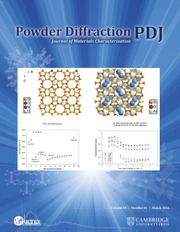Article contents
Towards fast reciprocal space mapping
Published online by Cambridge University Press: 01 March 2012
Abstract
A commercially available solid-state multiple strip detector was successfully used to perform reciprocal space mapping and to significantly reduce the data collection time as compared to conventional setups. The quality of the data benefits from the detector’s unique properties such as a high local linearity range and high dynamic range. This paper describes maps of symmetrical and asymmetrical reflections taken on different kinds of samples. A quasiperfect AlGaAs∕GaAs Multiquantum Well Structures (MQW) was used to evaluate details about the instrumental function. The main application of the proposed setup is for less perfect materials similar to GaN-based structures. A study of the thermal stability of a metal-organic chemical-vapor deposition grown InGaN∕GaN MQW by means of in situ temperature-dependent reciprocal space mapping demonstrates the possibilities of the new setup.
- Type
- XRD Instrumentation and Techniques
- Information
- Copyright
- Copyright © Cambridge University Press 2005
References
- 1
- Cited by


